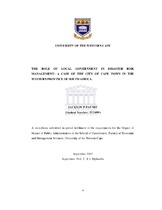| dc.description.abstract | Much has been said about the continued escalation of disasters, impacting negatively on the people’s livelihoods; mostly the poor. However, not enough is done to minimise or reduce the vulnerability of the people to risks as evidenced by the increasing numbers of disaster victims locally, nationwide and globally (Sahoo, 2005; Humby, 2012, Niekerk, 2005; Heijmans, 2008 and Cannon, 1994). The increasing disaster strikes in the City of Cape Town remain a major challenge to the surrounding communities (Cape Argus, 27 August 2012; Radar, 2010; Pillay, 2012 and Humby, 2012). Despite the expiry of the United Nations’ declaration of the period 1990-99 as ‘the decade for natural disaster risk reduction in 1999, the years after the declaration were characterised by increased disaster strikes globally (Niekerk, 2005; GTZ, 2002; UNDP, 2004 and Alexander, 2006). Although, new global commitments such as the 2005-15 Hyogo Framework for Action (HFA) which targeted to minimise disaster risks by 2015, very little has changed as people are increasingly becoming more vulnerable to risks than before (Niekerk, 2005; Heijmans, 2008; Alexander, 2006 and Radar, 2010). South Africa’s statistics on past recorded disaster events from the eighties to the present, show the same increased trend in the loss of property and human capital. For example, in South Africa, the period from 1980 to 2010 recorded 77 disaster strikes with a total of 1869 people being killed and negatively affecting 18 million livelihoods nationwide (Humby, 2012). Given such high figures of casualties, the negative impact of disaster remains one of South Africa’s major challenges as it curtails sustainable development. It is against this background that the study embarked on an investigation to establish the effectiveness and efficiency of the City of Cape Town Metro Municipal local government’s approaches to disaster risks. The principal objective of the study was to determine the effectiveness and efficiency of the City of Cape Municipal Government in addressing the persistent disaster risks through a proper implementation of the core disaster principles of risk reduction, prevention and mitigation, as well as the post-disaster activities of preparedness, rehabilitation, response and recovery. The specific objectives of the study are: (i) to assess whether incorporating disaster risk management into the integrated developing plan (IDP) has the potential to mitigate or prevent disasters; (ii) to examine the extent to which the City of Cape Town can make use of the principle of co-operative governance and assistance in disaster risk management; and (iii) to evaluate the impact of public participation in disaster risk mitigation, prevention and reduction. The study employed an integrated approach to data gathering. Sources of data included government acts, policies, internet sources and journal articles were included. These sources were supplemented by individual interviews with disaster officials and community members. From the investigation, the study found that neither government nor the community can successfully manage to reduce, prevent or mitigate the impact of disasters. The study found out that collaboration between communities, and the government would help resolve the situation, with the private sectors taking a facilitative role than working separately. The study then emphasizes that a collaborative approach by different stakeholders would work well only if public participation and co-operative governance are institutionalised in the various sectors of the City of Cape Town. | en_US |

